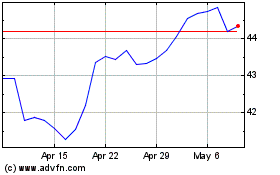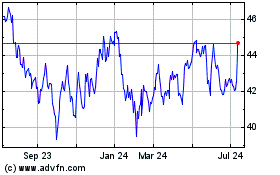New Jersey Natural Gas Reaches Agreement with Rate Counsel on Base Rate Case Proceeding
August 05 2008 - 7:00AM
Business Wire
New Jersey Natural Gas (NJNG) today announced that it has reached
an agreement with the New Jersey Department of the Public Advocate,
Division of Rate Counsel (Rate Counsel) on the principal financial
terms of its base rate case, originally filed in November 2007. The
agreement has been submitted to the presiding Administrative Law
Judge for her review. Her recommendation will go before the
Commissioners of New Jersey Board of Public Utilities (BPU) for
their final decision. Under the agreement, NJNG would increase its
total annual revenue by $32.5 million, effective October 1, 2008.
The agreement includes a return on equity of 10.3 percent, with a
51.2 percent common equity ratio. It reflects a rate base of $943.3
million for NJNG and an overall rate of return of 7.76 percent.
Additionally, the agreement calls for an expansion of the currently
approved Basic Gas Supply Service (BGSS) incentive programs, which
would continue through October 31, 2011. The utility would reduce
the overall depreciation rate from the previously approved 3
percent to 2.34 percent. It also agreed to include $1.4 million
annually in its base rate for operation and maintenance expenses
associated with pipeline integrity management and provide for a
deferred reconciliation of the actual costs incurred. (For more
details of the rate case agreement, please see the attached fact
sheet.) �We believe a reasonable agreement has been reached and
look forward to working with our regulators on the finalization of
the rate case,� said Laurence M. Downes, chairman and CEO of NJR.
�We are confident that the ultimate outcome will serve the best
interests of our customers and company.� As part of the agreement,
NJNG would also begin installing automated meter reading equipment
in a portion of its service territory and would transition to
monthly meter reads for all customers in an effort to provide
better service and more accurate information. This was the first
base rate case filed by NJNG since April 1993. Over that time, NJNG
has invested more than $650 million for system improvements and
expansion as well as compliance with new federal pipeline
regulations. In addition to absorbing cost increases associated
with inflation, the company has added over 1,500 miles of new main,
installed more than 132,000 new services and added approximately
157,000 new customers during that time period. NJNG originally
sought an increase of $58.4 million. Base rates are the portion of
the customers� bill designed to recover NJNG�s delivery costs,
including operating and maintenance expenses, and provide the
opportunity to earn a profit. Typically, natural gas bills consist
of two main parts: the delivery charge, which is the cost of
delivering the natural gas and maintaining the distribution system,
and the BGSS, or the portion of the bill that goes toward
purchasing the commodity and moving it through the interstate
system. Utilities do not make a profit on the sale of natural gas,
the cost of which is passed through to customers. While the impact
of this settlement upon the various classes of customers will not
be determined until later, it is expected that, if adopted, the
average residential customer using 100 therms a month could see an
overall increase between 4 and 4.5 percent. This adjustment would
help NJNG recover the costs of constructing, operating and
maintaining its infrastructure and enable the utility to continue
to provide customers with safe, reliable service. �As energy costs
continue to go up, we are acutely aware of the impact on our
customers, especially in these difficult economic times,� said
Downes. �While we continue to do everything we can to minimize the
impact of higher prices, we also encourage customers to save
through conservation and to take advantage of the many resources
available to help them meet their energy needs.� New Jersey Natural
Gas (NJNG) is the principal subsidiary of New Jersey Resources
(NYSE: NJR), a Fortune 1000 company. NJNG serves more than 483,000
customers in New Jersey�s Monmouth, Ocean, Middlesex and Morris
counties. This service area�s demographics and quality of life
contribute greatly to NJNG�s growth. NJNG�s progress is a tribute
to the dedicated employees who have shared their expertise and
focus on quality through more than 50 years of serving customers
and the community to make the company a leader in the competitive
energy marketplace. For more information, visit NJNG�s Web site at
www.njliving.com. Forward-Looking Statements This news release
contains forward-looking statements within the meaning of the
Private Securities Litigation Reform Act of 1995. NJR cautions
readers that the assumptions forming the basis for forward-looking
statements include many factors that are beyond NJR�s ability to
control or estimate precisely, such as estimates of future market
conditions and the behavior of other market participants. Other
factors that could cause actual result to differ materially from
the company�s expectations include, but are not limited to, the
company�s ability to obtain governmental approvals, the impact of
regulation (including the regulation of rates), the regulatory and
pricing policies of federal and state regulatory agencies and
changes due to legislation at the federal and state level. More
detailed information about these factors is set forth in NJR�s
filings with the Securities and Exchange Commission (SEC),
available at www.sec.gov. NJR does not, by including this
paragraph, assume any obligation to review or revise any particular
forward-looking statement referenced herein in light of future
events. NEW JERSEY NATURAL GAS BASE RATE CASE AGREEMENT FACT SHEET
On July 30, 2008, New Jersey Natural Gas (NJNG) and the New Jersey
Department of the Public Advocate, Division of Rate Counsel (Rate
Counsel) executed an agreement to resolve the principal financial
terms of NJNG�s base rate case filing, which was originally made
November 20, 2007. The agreement has been submitted to the
presiding Administrative Law Judge for her review. Her
recommendation will go before the Commissioners of New Jersey Board
of Public Utilities (BPU) for their final decision. Agreements have
been reached in the following areas: An annual revenue increase of
$32.5 million supported by the following: (dollars in thousands) �
Rate base $ 943,346 Overall rate of return � 7.76 % Income
requirement $ 73,204 Pro-forma income $ 54,180 � Additional income
requirement $ 19,024 Revenue factor � 1.7084 � Revenue requirement
$ 32,500 The agreed-upon rate of return of 7.76 percent includes a
return on equity of 10.3 percent as follows: � Amount (dollars in
thousands) � Ratios � Cost Rate � Weighted Cost Rate Long-term debt
$ 411, 344 41.6 % 5.44 % 2.27 % Short-term debt 66,000 6.7 % 2.90 %
0.19 % Customer deposits 4,447 0.5 % 4.79 % 0.02 % Common equity �
506,322 51.2 % 10.30 % 5.28 % Total $ 988,113 100.0 % 7.76 % The
rate increase is expected to be effective on or about October 1,
2008, coincident with any BPU-approved rate change resulting from
the company�s annual filing to modify its gas supply tariff, Basic
Gas Supply Service (BGSS). -- Depreciation Reduction -- Overall
composite depreciation rate of 2.34 percent reduced from 3 percent
-- Annual amortization of $1.649 million associated with NJNG's
non-legal asset retirement obligation Effective with this base rate
change, the Conservation Incentive Program (CIP) baseline would be
reset to the test year usage level, which is lower than its
original value. Beginning with the effective date of the rate
increase agreed to in this agreement, the CIP would compare actual
customer usage to the new lower baseline value. The revenue
increase is inclusive of approximately $13 million of test year CIP
accrual based on the original CIP baseline value. Pipeline
Integrity Management expenditures of $1.4 million are included in
base rates. NJNG would be authorized to defer additional
expenditures up to $700,000 annually, to be reflected in future
rate determinations but no later than NJNG�s next base rate
proceeding. Expenditures less than the $1.4 million level would be
returned to customers. Automatic Meter Reading (AMR) installation
in NJNG�s Monmouth County service territory is approved. -- BGSS
Incentive Mechanisms -- The Ocean Peaking Power incentive mechanism
would terminate upon approval of new base rates -- The remaining
BGSS incentive mechanisms would remain in effect through October
31, 2011 -- The Financial Risk Management cost limitations would
move to $6.4 million from the currently approved $3.2 million --
The Storage Incentive volume would increase from 18 billion cubic
feet (bcf) to 20 bcf -- NJNG agrees to conduct a review of gas
procurement and capacity options for submission to the BPU and Rate
Counsel no later than March 1, 2009. � -- NJNG has charged the
following amounts to income in fiscal 2008: -- $1.1 million
associated with deferred lost revenues previously reserved by NJNG
-- $900,000 related to the deferred Corporate Business Tax
surcharge enacted in 2006 -- $744,000, in aggregate, related to the
accrual of Allowance for Funds Used During Construction (AFUDC)
through June 30, 2008. � -- NJNG would submit to the BPU and Rate
Counsel quarterly reports to include the following performance
measures: -- Percentage of calls answered within 30 seconds,
abandoned calls and the percentage of calls blocked -- Percentage
of meters read each cycle and the number of re-bills per 1,000
customers -- Percentage of leak or odor reports responded to within
60 minutes and the percentage of service appointments met -- The
number of escalated complaints to the BPU per 1,000 customers Rate
design and tariff issues are being addressed during final
negotiations.
New Jersey Resources (NYSE:NJR)
Historical Stock Chart
From May 2024 to Jun 2024

New Jersey Resources (NYSE:NJR)
Historical Stock Chart
From Jun 2023 to Jun 2024
